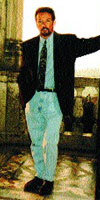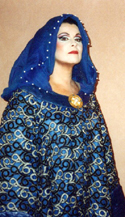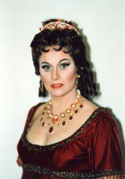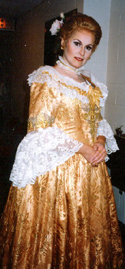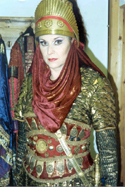|
Interview with Linda Roark-Strummer |
|||
|
About the author, Mr. Patrick C. Byrne
Mr. Byrne studied voice with Professor Thompson at U.C.K.C, as well as Madame Lenora Lamar-Moss, and Linda Rossi, a protťgťe of Richard Tucker. His interest in opera has led to the development of a record label, OMBRA. He is a graduate of Rockhurst in Kansas city. Mr. Byrne has completed a co-authorship of a book on Maria Callas, with celebrity author Taylor Pero.
|
Linda Roark-Strummerís career contains a more than impressive list of roles. At La Scala she had a great success in what might be described as one of Verdiís most demanding characters, Abigaille in Nabucco. Carnegie Hall, Teatro Bellas Artes. Teatro Colon, Teatro San Carlo, Ravenna and Marseille, among others were witness to her searing portrayal of the vengeful princess of Babylon. Other larger than life heroines include Odabella in Verdiís Attila, Pucciniís Turandot, Strausís Salome and Herodias. and possibly the ďB-wordĒ of all time, Lady Macbeth. For variety there is Fata Morgana from Prokofievís enchanted The Love for Three Oranges, a dramatic Tosca, Sieglinde in Die Walkure, the Verdi Requiem, Beethovenís Ninth Symphony, and another barn-stormer, Brunnhilde in Siegfried. Among the many illustrious houses where she has held the stage are Veniceís Teatro La Fenice, Opernhaus Zurich, Buenos Aires and Chileís Teatro Municipal, Herodiade Amphitheater in Greece, Arena di Verona, etc. Madame Roark-Strummerís role that I am most familiar with is that of Lucrezia Contarini in Verdiís brooding masterpiece, I due Foscari. I found a VHS of the La Scala production several years ago in a little shop near the Fenice in Venice. The clerk assured me the tape would play on my American equipment. Of course, it didnít. Luckily I have a friend that converted it to the right format for me. What I saw hooked me forever on this opera. A simple but elegant production, and a soprano who blew me away. I had only known the opera from a live performance cd with the legendary Leyla Gencer. I always loved the marvelous and endless melodies, but what I saw on my VHS was a flood of passion and a vocal force that was gripping. Listen to a mp3-sample of Mrs. Roark-Strummer's voice while reading this interview: [PB] I am going to begin the interview with a heart felt welcome to Linda Roark-Strummer and a thank you for joining us on the Belgian Opera Guide. [LRS] Iím very pleased to be here!
[PB] I am going to quote a review of your Lucrezia Contarinió"Linda Roark-Strummer as Lucrezia in I Due Foscari has more balls than her husband or her father-in-law, the Doge. She sings very strongly and establishes herself as more than a force in the drama. Her passionate portrayal of the long suffering Lucrezia was a marvel". [LRS] I have always said singing Lucrezia is much more demanding than Abigaille or "The Lady". I mean, once she is one stage, she never leaves. The tenor is through in the second act, The Doge doesnít have that much in the first act, so when it comes to his aria in the last act, heís just hitting his pace. Poor Lucrezia is out there all night! The tessitura is high and the orchestration full and there are LOTS of hi Cís. The musical pacing of the piece is only slightly better than Giovanna DíArco. Giovanna is another very taxing role. By the end of either of them, you know you have earned your pay!
[PB] As due Foscari is one of Verdiís early works I think it harks back in some ways to the belcanto. I know your technique displays a strong basis in this school of singing. [LRS] The training from belcanto should be the basis for ALL singing. Now that I teach, I am constantly talking about these very things to my students. There are four very important things, I tell them, about singing: 1. Line. 2. Line. 3. Line. 4. Line. Oh! I forgot one: LINE. We have all have heard the great quote from Toscanini: "Parla Forte, Canta piano." Itís the words in Belcanto that are important. One MUST infuse the words with meaning and color WITHOUT losing the smooth transition from one note to the next, and one vocal registration to the next. That means the air must continue to flow. It takes lots of careful training.
[PB] I am anxious to hear about your concert for Líopera de Montreal in which you sang the duet from Cavalleria with the wonderful baritone, Jeffrey Kneebone. I discovered him in a production of Ballo and was completely taken with his artistry. [LRS] I had a great time singing with him. Unfortunately, he was called to leave us too soon. He was very nice, and we "played" off of each other very naturally. We didnít have much chance to rehearse or formally stage anything but it felt like we had. The day before I was to fly up to Montreal, I had fallen and badly twisted my ankle. I had an "air cast" on it and could walk, just not very fast. Jeffrey, gentleman that he was, escorted me on and off stage in grand fashion!
[PB] One of the great characters of all time is Lady Macbeth, operatically or stage wise. Ellen Pfeifer of the Boston Globe said of your performance, ďBurning up the stage as Lady Macbeth, soprano Linda Roark-Strummer brought volcanic tone and temperament to the performanceÖ At the highest volume levels and pitches, the voice erupts thrillingly. The soprano is alert to every nuance of every word. Her Lady Macbeth was at once seductive, ruthless, castrating, and finally, pitiable. I loved it when in the first act aria she planted her feet, spread her arms, and exploded with ambitious fury." [LRS] Ms Pfeifer was very kind. There is no way to sing the dear "Lady" but with total commitment of voice, mind, body, and soul. I liked singing her!
[PB] In an entirely different style, but equally as demonic is Herodias in Salome. Robert Levine described your Queen as "venom" and went on to comment on your costumeÖĒBig red and black bad taste dress.Ē How do you feel about costumes, particularly some of the bizarre and questionable things you see on stage today. Was there ever anything you refused to wear or do for a director? [LRS] I have often wished to put costume designers into their own designs and make them do what we are called upon to do where we are called upon to do it. I canít remember ever having refused a costume but a couple of times I had to shake my head in wonder. There was the costume I wore for Abigaille at the Arena di Verona. Late July and August in Verona arenít even cool at night. I was given a costume that had leggings (of sorts) with the obligatory breast plate of Abi the Warrior and some kind of skirt. The leggings were made of some synthetic material and lined with an acetate fabric that basically repelled water! I wore them once, for the opening, and when I took the leggings off after the first act, the lining was totally sweat through and falling apart. I was amazed I was still standing because, rightfully, I should have passed out from dehydration! The costume was way too heavy for the weather in which I was singing. It might have been different in an indoor, air-conditioned theater but certainly not I the Arena. There really isnít much one can do about costumes unless one wants to get a reputation as being a "difficult" artist. The only thing I would never have done, is perform in my birthday suit. Fortunately, it never really came up so I wasnít forced to put on my Diva act.
[PB] There is now a web site called "Against Modern Opera". What they mostly discuss is not really operas that have been recently written, but the atrocities that some of these so-called directors force on audiences and artist alike. A chorus sitting on toilets in Ballo, Abigaille dressed as a bumblebee, a Norma in an orange punk rock wig, a Rigoletto in what appears to be a junkyard, the endless use of anything relating to the Nazi style when it has nothing to do with the opera in front of you. [LRS] I donít care for it. I understand directors wanting to find a new approach to "the same olí thing", but mostly I believe they are not secure enough in themselves, or trusting enough in their performers, to take a more traditional approach. The stories of the Operas are as pertinent today as they were then. However, MOST operas do not withstand a change in period because of references in the text to laws and historical occurrences, traditions, etc. Therefore, at some point, a modern handling and what the composer/librettist wrote are at odds with each other. IF a director can reconcile these problems, then go for it. But you have to make a traditionalist like me (and my husband, Peter Strummer) believe it! That is a tough assignment.
[PB] Are there roles you wish you had assumed? I can certainly imagine you in Mayrís Medea in Corinto. [LRS] Oh dear. Yes. And a few I would have loved to do more often than I got to. I would have loved to do a Salome (except for the nude thing) and it did come up once. I was not, however, at the time ready to sing it. Of course, at the moment, I canít come up with any of them. A little more middle Verdi would have been nice. I would like to do some comic roles now. It is a side of me few know about.
[PB] Would you care to comment on the state of singing today? As a teacher, are students willing to invest the time it takes to really build a solid technique that will carry them for more than a few years. [LRS] Well, now you have handed me a can opener and a can of worms! I find the State of the Art of Singing in great peril. I would LOVE to open a school of vocal arts and have given a lot of thought to it. Unfortunately, I donít have the finances it would take. Would someone please explain to me, how an 18 year old, going off to college to learn to sing, is supposed to do that with one lesson a week? The singers of the past studied every day with their mentors for seven years. They learned vocal technique, style, interpretation, character building, history, ear training, sight reading, and so on, as pertained to the art they wanted to pursue. Today, for some reason, they are expected to become composers, mathematicians, biologists, computer gurus and paper writers. They are forced to sing in choruses (Non operatic) at a point in their training where they are technically ill equipped to do so. (There is a big rift between choral directors of today and teachers of Operatic vocal technique to which I do not have time or space to address myself. It is a many faceted issue.) All that aside, I find the type of casting they are doing today such a mixed bag that no body knows what they are supposed to be singing. Kloiberís fach book, as imperfect as it is, is no guide anymore. There was a time, for instance, in the mid 70ís, when we had at the Met a Cosi cast that consisted of, Leontine Price, George Shirley, Sherrill Milnes, Ezio Flagello, etc. In the 50ís, a Cosi cast of Elenor Steber, Blanch Thebom, Roberta Peters, Richard Tucker, Frank Querrera and Lorenzo Alvary. Today, a Cosi cast would be made up of much lighter voices. We have Toscaís and Countesses and Salomes and Manon Lescauts, who are no where near the caliber or voice size of a Nielsen, Marton, or a Gwyneth Jones. Not only that, because the recording industry is unable AND unwilling to record bigger voices, they choose smaller one which fit the recording studio better. Then these voices, through the recording industry, are being pawned off to the major Opera houses. The audiences are being cheated because these voices donít carry well enough in the house. I find most students DO want to do the work. Unfortunately, they are not being given all the opportunity to do the work they need to be doing. My/Our students learn really quickly, what we expect of them and only a few havenít risen to the call. The interesting part of being a teacher, is that you have to wear many hats. You arenít only the teacher, but you are a confidant, a mother or father, and a psychiatrist. Everything can affect the way a students sings. Sometimes, in order to solve a vocal problem, you have to find out what caused it. It can be from ADD to depression to overbearing parents to the earth shattering argument they had with their "current squeeze". If they canít get by any of these (and more), something stands in the way of the voice and the voice lesson and their progress. There are, also, all too many young people who belong to todayís "Entitlement Generation". They think, that just by showing up, they are entitled to a high grade and expect to leave the university ready to conquer the world. Most of them never learn languages, and because we now have the wonderful Nico Castel books, they copy the translations out of those books but never really learn what they are saying. They donít learn to understand conjugations of verbs nor do they know what is being said to them by the other characters on stage. The universities play into the "Entitlement Generation" by treating college as if it were just an extension of High School. They tell the prospective student how good they are and how much they are going to help them. They are constantly told how good they are. The student leaves expecting to conquer the world. I would like prospective voice students to think about one thing before choosing a school to go to. It is about the TEACHER. Not the school. No school can teach you to sing. Only a good teacher can. Unfortunately, there are not many good teachers in colleges today. You need to study with someone who has done years of professional work. Look carefully at their biographies. Where did they really perform? Take time to listen to their students. Where are their students now? There are so many more questions to ask and things to look for but weíd be here forever... Note: This interview was conducted in January 2013.
Dit
interview werd geschreven door Patrick C. Byrne, een Amerikaans
operaliefhebber, en ons toegezonden in januari 2013. Callas Corner - Opera Singer Maria Callas, Callas CD's & Merchandise http://members.aol.com/OmbraRecds/
|
||
|
|
|||
